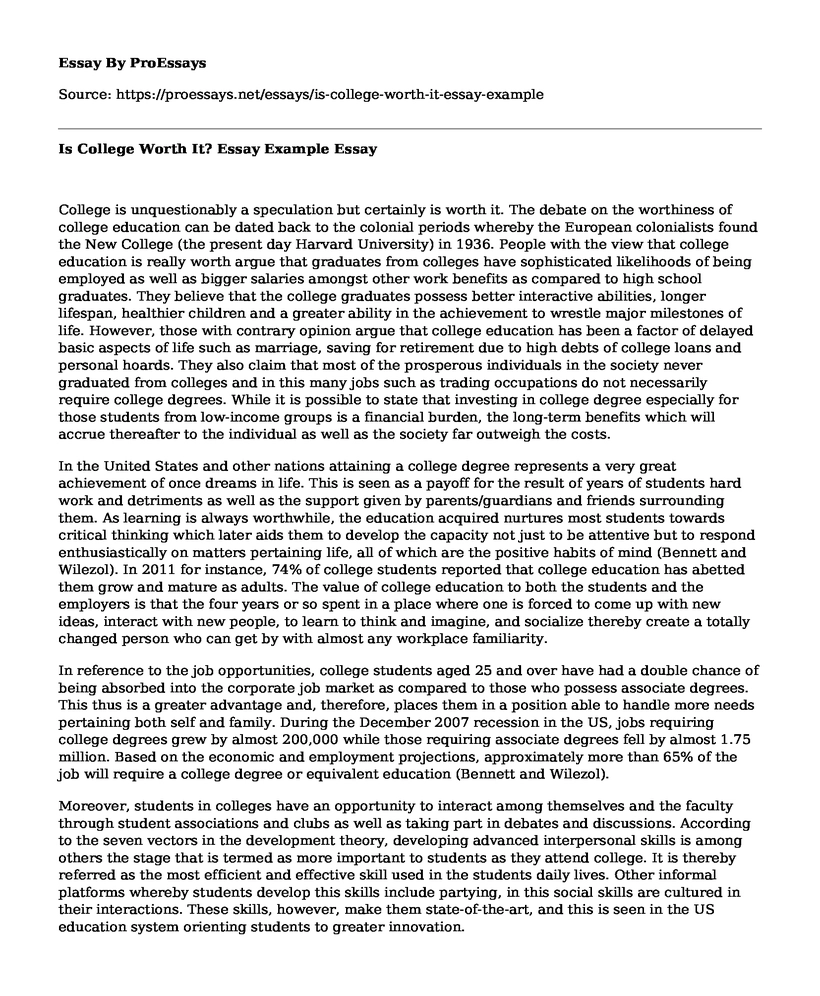College is unquestionably a speculation but certainly is worth it. The debate on the worthiness of college education can be dated back to the colonial periods whereby the European colonialists found the New College (the present day Harvard University) in 1936. People with the view that college education is really worth argue that graduates from colleges have sophisticated likelihoods of being employed as well as bigger salaries amongst other work benefits as compared to high school graduates. They believe that the college graduates possess better interactive abilities, longer lifespan, healthier children and a greater ability in the achievement to wrestle major milestones of life. However, those with contrary opinion argue that college education has been a factor of delayed basic aspects of life such as marriage, saving for retirement due to high debts of college loans and personal hoards. They also claim that most of the prosperous individuals in the society never graduated from colleges and in this many jobs such as trading occupations do not necessarily require college degrees. While it is possible to state that investing in college degree especially for those students from low-income groups is a financial burden, the long-term benefits which will accrue thereafter to the individual as well as the society far outweigh the costs.
In the United States and other nations attaining a college degree represents a very great achievement of once dreams in life. This is seen as a payoff for the result of years of students hard work and detriments as well as the support given by parents/guardians and friends surrounding them. As learning is always worthwhile, the education acquired nurtures most students towards critical thinking which later aids them to develop the capacity not just to be attentive but to respond enthusiastically on matters pertaining life, all of which are the positive habits of mind (Bennett and Wilezol). In 2011 for instance, 74% of college students reported that college education has abetted them grow and mature as adults. The value of college education to both the students and the employers is that the four years or so spent in a place where one is forced to come up with new ideas, interact with new people, to learn to think and imagine, and socialize thereby create a totally changed person who can get by with almost any workplace familiarity.
In reference to the job opportunities, college students aged 25 and over have had a double chance of being absorbed into the corporate job market as compared to those who possess associate degrees. This thus is a greater advantage and, therefore, places them in a position able to handle more needs pertaining both self and family. During the December 2007 recession in the US, jobs requiring college degrees grew by almost 200,000 while those requiring associate degrees fell by almost 1.75 million. Based on the economic and employment projections, approximately more than 65% of the job will require a college degree or equivalent education (Bennett and Wilezol).
Moreover, students in colleges have an opportunity to interact among themselves and the faculty through student associations and clubs as well as taking part in debates and discussions. According to the seven vectors in the development theory, developing advanced interpersonal skills is among others the stage that is termed as more important to students as they attend college. It is thereby referred as the most efficient and effective skill used in the students daily lives. Other informal platforms whereby students develop this skills include partying, in this social skills are cultured in their interactions. These skills, however, make them state-of-the-art, and this is seen in the US education system orienting students to greater innovation.
Furthermore, studies have proved that graduates from colleges are more productive as members of a given society. The essence of giving back to the society is majorly felt. The society wholly benefits from the nurtured talents, abilities and the capabilities incorporated in their students. College education results in increased productivity reduced crime, better-quality health and enhanced citizenship. The increased percentage of those involved in crime in most societies is the high school students compared to college students. In addition, it has been found that college graduates are more willing to take part in community volunteerism and social work that involves working with the less fortunate and the community services as compared with to bachelors or associate degree graduates.
Lastly, statistics from the United States and Britain estimate that between 60 to 80% of jobs are assimilated through networking. Colleges have always provided platforms for students to join and be members of sororities and fraternities, clubs, and teams as well as taking part in a number of social functions in order to encounter new people from different upbringings and network with possible corporate connections (Bennett and Wilezol). On the other hand college internships often result to significant contacts within a students preferred field of study. Most of the colleges offer tips in networking, communication skills, and career related consultations among others. In conclusion, a college education is of more beneficial to students and the society at large. In as much as studies have tried to prove it as a waste of time, the benefits outweigh it and places more paybacks to the students, guardians and the society.
References
Bennett, William J, and David Wilezol. Is College Worth It?. Print.
Cite this page
Is College Worth It? Essay Example. (2021, Mar 10). Retrieved from https://proessays.net/essays/is-college-worth-it-essay-example
If you are the original author of this essay and no longer wish to have it published on the ProEssays website, please click below to request its removal:
- Rotary Club Essay for Scholarship
- Intertwining Autobiographical Events in A Farewell to Arms
- People Who Swear Have Bigger Vocabularies Essay
- A Review of Group and Individual Work on Students' Performance
- Breaking the Surface by Greg Louganis Essay Example
- Essay Sample on Pedagogy in Arabic Class
- Free Report Example on Bullying: A Global Threat Needing Immediate Intervention







